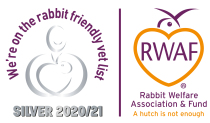Looking After Your Rabbits
After dogs and cats, rabbits are the UK’s most popular pet. However due to the misconception that they are an easy ‘childrens pet’ many of them live lonely lives in small hutches on poor diets. Many of these rabbits have preventable health problems. Thanks in part to some of the work carried out by Frances Harcourt Brown the nutrition of pet rabbits, has improved a lot over the last 10 years so some of these problems, especially dental problems are less common.
Rabbits live in groups in the wild and so will be happier living with a companion, usually another rabbit of the opposite gender (neutering is obviously important). Guinea pigs are not suitable companions.
They need plenty of space. Virtually all hutches are too small, large runs are needed with space to hop and run. Runs can contain toys such as tunnels and digging areas to give your rabbit both exercise and mental stimulation. If your rabbit lives loose in a house then you need to need to pay attention to bunny-proofing your house as they chew and can cause a lot of damage especially to electrical cables and skirting boards.
Feeding should be predominantly leafy greens including grass and hay. Weeds are fine and you can share your healthy five-a-day with your rabbit. Dry food needs to be fed carefully as this is often overfed and can lead to obesity. If obese rabbits become unwell they readily develop hepatic lipidosis which can be fatal. Obese inactive rabbits have an increased risk of developing painful spinal problems. Pellets are preferred as their nutrients are balanced. The museli mixes are often only selectively eaten leading to the rabbit consuming an unbalanced diet and this can lead to dental disease. These should not be fed.
We do see rabbits with painful bladder problems associated with sludgy urine. This is less likely if the rabbit drinks plenty of water and is active Eating leafy greens encourages water intake and rabbits have been shown to drink more if offered water from a bowl than a bottle so bowls are preferred.
Although some rabbits are easy to handle many do not appreciate it. They can struggle and scratch and so should not be picked up by children as they may be dropped. Rabbits are prey items so do not be surprised if your pet rabbit does not appreciate being handled.
We vaccinate rabbits annually against Myxomatosis and Viral Haemorrhagic Disease (now available in a combined annual vaccine) and we advise this even in house rabbits as we have seen cases in house rabbits.
The British Veterinary Assocaition have produced a useful leaflet on rabbit care which can be found here and Petsavers have another handy leaflet on rabbit care.
2020 NEWS; We have recently being accredited as a Rabbit Friendly Practice by the Rabbit Welfare Association in recognition for our experience and expertise with rabbits, our facilitiies such as seperate hospitalisation (in the cellar known as "the warren") and the nursng care our team provide. Its very important to house rabbits away from cats and dogs as both these species are predators & their presence isn't going help a rabbit relax & recuperate.






